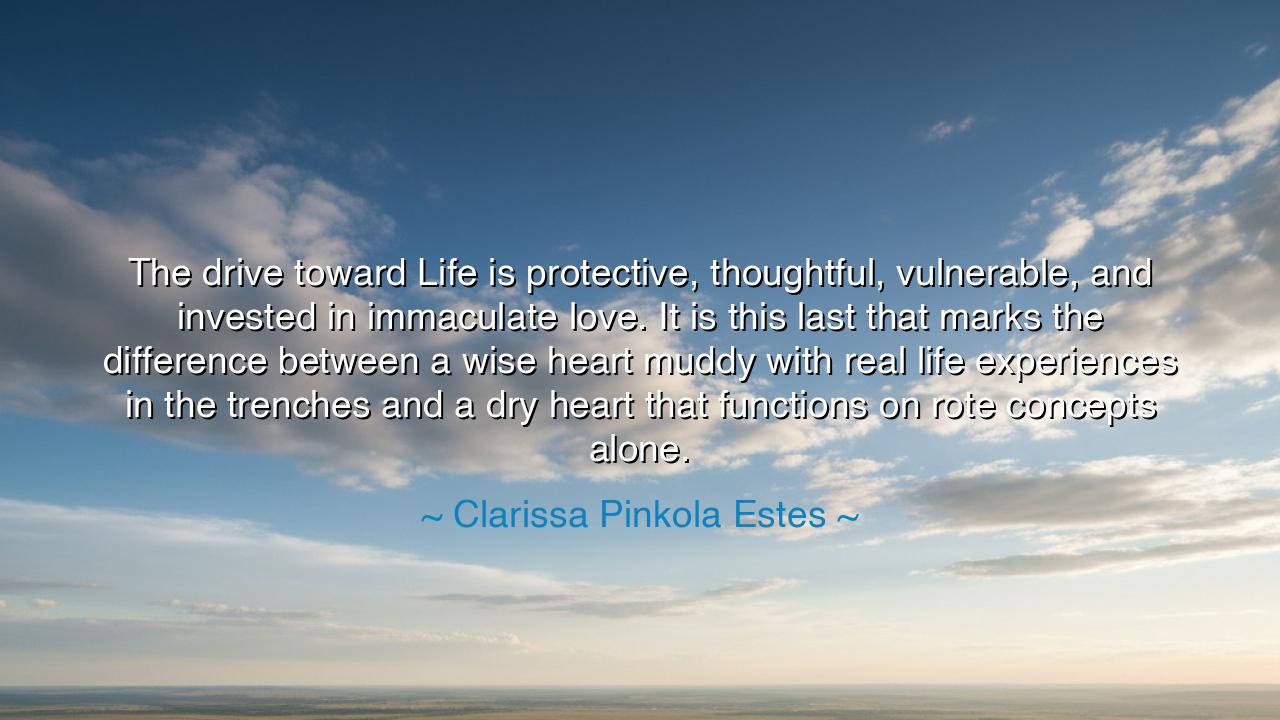
The drive toward Life is protective, thoughtful, vulnerable, and
The drive toward Life is protective, thoughtful, vulnerable, and invested in immaculate love. It is this last that marks the difference between a wise heart muddy with real life experiences in the trenches and a dry heart that functions on rote concepts alone.






"The drive toward Life is protective, thoughtful, vulnerable, and invested in immaculate love. It is this last that marks the difference between a wise heart muddy with real life experiences in the trenches and a dry heart that functions on rote concepts alone." These profound words by Clarissa Pinkola Estés speak to the heart of what it means to live a life filled with depth, compassion, and wisdom. The drive toward life is not merely about surviving or existing, but about living fully, with awareness, vulnerability, and a heart capable of immaculate love—love that is unconditional, protective, and filled with deep care for others. Estés contrasts this with the dry heart, one that functions mechanically, based on rote concepts and theories without the warmth of lived experience and true emotional depth. The wise heart, forged in the trenches of life, knows what it means to love, suffer, and rise again.
In the ancient world, wisdom was never seen as something that could be gained solely from books or theoretical knowledge. Socrates, for example, emphasized that wisdom comes through experience, especially through the difficult and sometimes painful process of engaging deeply with life. He famously said, "The unexamined life is not worth living," yet this examination was not an intellectual exercise alone; it was a deep emotional and moral engagement with life itself. The true philosopher, or wise person, was someone who understood the complexities of human nature—not through abstract concepts, but through personal experience, suffering, and learning. Socrates was not an isolated intellectual; he walked with others, challenging them, living with them, experiencing the world together. Estés draws on this idea—true wisdom is not simply a matter of memorizing facts or functioning in mechanical ways, but involves a heart that has been tempered by real experience and is capable of vulnerable love.
This idea resonates through the works of Aristotle, who spoke of virtue as something that could not be understood through theory alone but had to be practiced and lived. He argued that a virtuous life was one that engaged fully with the world, faced its challenges, and acted in ways that nurtured the well-being of others. The philosopher knew that a heart hardened by fear or detachment would never truly understand what it meant to live in harmony with others or with oneself. Just as Estés suggests, Aristotle saw that a heart touched by love, whether of others or of life itself, is a heart that becomes wise—one that has felt deeply, grown through suffering, and emerged with the capacity to love in ways that are not superficial or rote, but genuine and immeasurable.
The story of Nelson Mandela offers a striking modern example of this wisdom. During his 27 years in prison, Mandela was not only physically confined, but emotionally tested. His heart, during this time, could have hardened, becoming a dry heart, functioning on rote concepts like revenge or hatred. But Mandela’s heart grew deeper through the experiences of suffering and reflection. His wisdom was not only intellectual; it was born from a deep well of love and compassion for his people and his country. When he emerged from prison, he did not seek vengeance but sought reconciliation. His heart, shaped by years of trial, had the ability to see beyond the injustices done to him and to respond with love for all, even those who had oppressed him. Mandela’s wisdom was the wisdom of someone who had been in the trenches of life, who had experienced both great loss and personal transformation.
Estés reminds us that true wisdom is not simply the product of intellect but of a heart that has been muddied by the realities of life. The dry heart, on the other hand, represents those who seek to live through rigid concepts and theories, without ever truly engaging with the full spectrum of human experience. They may have knowledge, but their knowledge is disconnected from the rawness of real life, the emotions that come from loss, love, struggle, and connection. The wise heart is one that has loved deeply, suffered greatly, and yet has found the strength to remain open and vulnerable—and in doing so, it becomes capable of the most immeasurable love.
The lesson in Estés’ words is simple yet profound: wisdom is not a cold, intellectual pursuit, nor is it something that comes merely from studying theories. It is born from the fullness of living, from the willingness to engage with life in all its complexities—joy and sorrow, triumph and defeat, love and loss. When we embrace the world with vulnerability, we open ourselves to the deepest forms of connection and understanding. This wisdom, rooted in lived experience, is what allows us to live with grace and compassion, to love others deeply, and to rise above the mechanical and the superficial.
In our own lives, let us strive to cultivate a heart that is open to the complexities of life. Let us move beyond the pursuit of rote concepts and engage with the world with love, compassion, and vulnerability. When we do so, we not only grow in wisdom but also become a source of healing and strength for others. Let us remember that true wisdom comes not from avoiding life’s trials but from embracing them and allowing them to shape us into beings capable of immeasurable love, just as Mandela, Socrates, and the wise among us have done. By doing so, we find fulfillment not only for ourselves but for those whose lives we touch.






AAdministratorAdministrator
Welcome, honored guests. Please leave a comment, we will respond soon